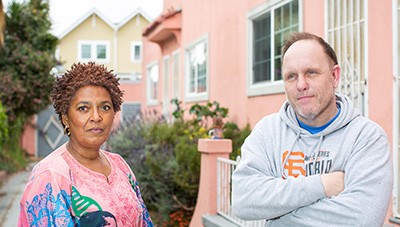In 2006, Richard Wingart fled San Francisco and moved across the bay, ending up in the Santa Fe neighborhood of North Oakland. “I used to live in San Francisco and I watched this exact thing happen to me and my friends there,” said Wingart, as he stood on the sidewalk outside the single-story pink stucco apartment building at 840 55th Street.
Wingart pays $700 a month for his 300-square-foot studio. But last week, Wingart came home and found a letter from his new landlord’s attorneys — the Bornstein and Bornstein law firm — taped to his front door. It was a three-day notice to pay rent or get out. Wingart insisted that he paid the rent, and that the new landlord, Arlen Chou, an investor from Los Altos, must have lost it. But the mix-up over $700 is only the beginning of Wingart’s problems.
Wingart’s two neighbors — Kendahsi Haley and Cris Cruz — in the four-unit building also got letters on their doors informing them that on August 1 their rent will rise to $1,350. In a previous letter to Haley, Chou explained that this was only the first step toward the ultimate rental price of $1,500. Haley, who lives on a small pension from when she was a substitute teacher for nineteen years in Los Angeles, currently pays $600 a month. Cruz’s rent is also $600. Chou is demanding a 125 percent rent increase in three months.
Haley filed a petition with the City of Oakland’s Rent Board in February to oppose the rent increases. She and her neighbors believe the rent increases are illegal. Her petition also states that Chou is intending to remove their parking spaces, seeking extra money for parking, and charging rent of $150 for garage space. Chou is also banning pets, even though Wingart and Cruz both have dogs, and wants them to pay $25 per day, or $750 per month, for each unauthorized animal. Haley, Wingart, and Cruz believe the incredible rent increase and new rules are designed to push them out in order to make way for wealthier tenants. And as rents continue to skyrocket across Oakland, they don’t know if they can afford to stay. Like an untold number of Oaklanders, they fear they will soon be displaced.
Their saga began in 2010 when their previous landlord, Kenneth “Grey” Kolevzon, converted the building’s five apartments into four. Kolevzon, who was born in Berkeley and had lived in Oakland since 1987, works as garden education coordinator for the Oakland Unified School District. With borrowed money from a friend, Kolevzon bought the building in 2007. He intended to create affordable-homeowner housing.
“My goal was to convert to condos and sell them at the price I got them for,” Kolevzon said in an interview. “And I’d walk away with a very cheap condo in the process.”
By turning two of the apartments into one, thereby reducing the building’s total number of units to four studios, Kolevzon was able to sidestep the burdensome state laws regarding condo-conversion, which apply to buildings with five or more units.
“But little did I know,” said Kolevzon, “that between the city planning and building process, and the lending environment with the banks, it was one nightmare after another.”
“Grey sent out a mass email back in early 2012, and we spoke on the phone after that. His vision was something I was down with,” said Cruz, who moved into one of the apartments shortly thereafter. Cruz hoped to buy one of the condos and plant roots in Oakland.
“I was stoked,” said Wingart, who lived in the building before Kolevzon bought it. “He was going to sell me my unit for $95,000.”
As for Haley, she said she wasn’t told by Kolevzon when she moved into the building in December 2009 that it was being converted to condos for sale. She said she wouldn’t have moved in if she knew about the risky plan Kolevzon was pursuing. Nevertheless, all three attended lender workshops seeking loans to buy their studios once the condo conversion finalized.
“I knew something was wrong when I found out from Wells Fargo that they weren’t going to make the loan because it was for too small of an amount,” said Wingart. “No bank would make the loan, and I would have to go out and get my own loan for some outrageous interest rate.” Wingart said the impression lenders gave them was that they weren’t “worthy” enough.
According to Kolevzon, a Wells Fargo employee said that to be eligible for condo mortgages the building would need expensive upgrades. “They forced me to do $10,000 in upgrades and then still told us we didn’t even qualify for the loans,” said Kolevzon. He said he tried multiple other lenders and programs for low-income homebuyers, but each considered an affordably priced four-unit condo building ineligible by their standards.
Wells Fargo representatives told the Express that they were looking into the matter.
“At that point, I had spent $60,000 of my personal money, so I just said forget it because there was no end in sight,” said Kolevzon. “Honestly, it was the most upsetting experience of my entire life.” In November, Kolevzon agreed to sell the building. He moved to Pinole earlier this year.
The new owner is Golden State Ventures, LLC, a Milpitas-based company run by Chou. Chou did not return multiple phone calls and emails seeking comment for this story. The law offices of Bornstein and Bornstein also did not return a phone call.
Chou, however, is an active member of a real estate investment social network called BiggerPockets. In a forum posting on BiggerPockets, Chou wrote: “The units will be handed over to me fully vacant at the end of January. The best part of the property is that as they are condominiums, they are EXEMPT from rent control!” Chou called it his “own a little island of rent control free property in a rising neighborhood in Oakland.” In other posts, Chou wrote that he intends to divide the building back into five units and rent each one out to “maximize rental potential.”
Having nowhere to go, and feeling that they had a legal right to stay, Haley, Wingart and Cruz decided to not move out for the time being.
“The system we have right now with property owners making so much money off of us, it’s completely wiping out the ability of people like me to live here,” said Cruz, who works at the East Oakland Boxing Association as the garden and youth intern coordinator. She runs tutoring and mentoring programs for children affected by the traumatic levels of poverty and violence common in Oakland’s flatlands. “I don’t know if I can keep this job if I can’t get here in a reasonable amount of time,” said Cruz, who added that if she were to move out of Oakland, her car is in no condition to commute.
Haley’s petition before Oakland’s Rent Board is scheduled to be heard on September 1, after the rent increase demanded by Chou is supposed to take effect. Haley and her neighbors believe, however, that the building’s condo-conversion was improperly approved by the city. They plan to argue that their studios are still covered by rent control. In a May 2 letter to Rachel Flynn, Oakland’s director of planning and building, Haley wrote that the building remained a five-unit property through the condo-conversion, and for several years the garage was even rented out as a living space, making it effectively a six-unit apartment building. Haley wrote also that the building was never fully up to code, questioning why the condo-conversion was approved. Haley and Cruz also said that numerous requirements spelled out in Oakland’s condo-conversion ordinance weren’t followed. They said they never received sixty-day notices of intent to convert, a notice of tenants’ rights, copies of the sub-divider’s tenant assistance program, and other mandatory notices. And Haley, who is a senior, said she never received an option for a lifetime lease of the condo, as spelled out in Oakland’s law.
“The fact that the city has no way to confirm that tenant protections requirements have been completed — it’s a major flaw,” Hale said. “It lends itself to situations where a condo-conversion can be approved that hasn’t met legal requirements.”
For his part, Kolevzon maintains that he followed the law during the condo-conversion process. And Chou appears to be operating under the premise that the four-unit condo building is exempt from rent control due to California’s Costa Hawkins Act, which bans rent control on single-family homes and condominiums in the state.
“If this is what Oakland wants and what the politicians downtown are going to let happen, well, this is going to ruin Oakland,” said Wingart. “We will lose our culture. It’s sad.”
“How can a city have rents that exceed the average income levels of the city’s residents?” asked Haley. “Have you ever seen a place that doesn’t have all of the life, the diversity in it? Diversity isn’t good just because it’s good,” said Haley. “It’s good because everyone has their own value, but that’s being destroyed right now.”














